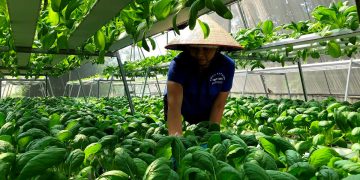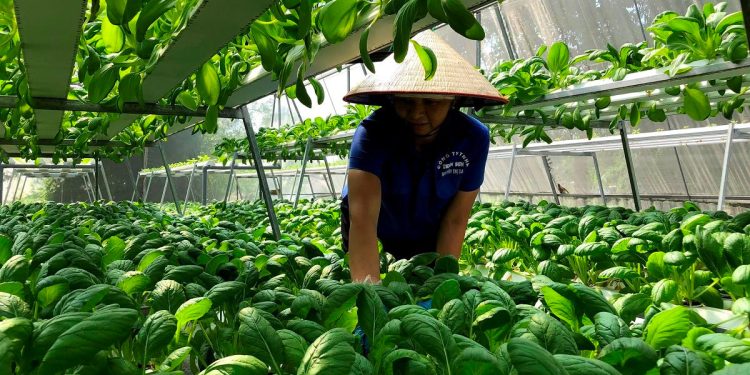#HighTechFarming #SafeVegetableProduction #SustainableAgriculture #VegetableCultivation #AgTechInnovation #AgriculturalSustainability #HanoiAgriculture #FarmersSuccessStories #FoodSafety #GreenAgriculture
In recent times, Hanoi has been vigorously promoting the production and consumption of safe vegetables through concentrated efforts, employing advanced technologies, establishing supply chains, and enhancing product value. However, challenges persist in the production and business of safe vegetables. What are the solutions for the stable and sustainable development of safe vegetable cultivation?
High Income through High-Tech Vegetable Cultivation
Several agricultural cooperatives in the city have incorporated high-tech solutions into safe vegetable production, not only effectively controlling diseases but also elevating economic value.
Nguyen Xuan Nghia, Director of the Vinh Thuong Agricultural Cooperative in Son Cong commune, Ung Hoa district, shared their success story. In 2016, with support from relevant authorities, the cooperative experimented with cultivating 5 hectares of safe vegetables. The use of organic fertilizers resulted in robust and disease-resistant growth, offering economic value 40 million VND/ha higher than traditional vegetable cultivation.
Recognizing the effectiveness, the cooperative expanded its production area to 27 hectares, certified by the Plant Cultivation and Protection Sub-Department (Department of Agriculture and Rural Development of Hanoi) as a qualified region for safe vegetable production. In addition to expanding safe vegetable cultivation, the cooperative boldly constructed a high-tech greenhouse model covering 5,000 square meters, with a total budget exceeding 1.6 billion VND. This modern design, equipped with an automated irrigation system and solely using organic fertilizers without pesticides, yielded significantly higher productivity and quality compared to traditional methods.
Similarly, the Cuoi Quy High-Tech Organic Vegetable Cooperative in Dan Phuong district, under the leadership of Dang Thi Cuoi, demonstrated the benefits of applying high-tech methods in a net house with automatic irrigation. This not only minimized disease impact but also reduced labor-intensive care. Currently, the cooperative harvests 2-4 tons of fresh vegetables daily, selling at prices ranging from 20,000 to 30,000 VND/kg, achieving an average income of nearly 6.6 billion VND/ha/year.
Step-by-Step Expansion of Cultivated Areas
High-tech vegetable cultivation differs significantly from conventional methods due to substantial initial investment requirements. However, the higher quality and productivity, coupled with reduced risks from weather fluctuations and diseases, make it a lucrative venture. Furthermore, with stable market demand, the annual revenue can reach tens of billion VND per hectare.
From now until 2030, Hanoi aims to transition agriculture from production-oriented thinking to economic-oriented thinking, focusing on green values. The city plans to invest extensively in specialized vegetable-growing areas, emphasizing infrastructure improvement linked with brand building. Simultaneously, efforts will be directed at promoting the development of advantageous vegetable products, establishing large-scale specialized vegetable-growing areas adhering to market standards and requirements.
Specific Goals:
Organic vegetable production area: approximately 400-500 hectares.
High-tech vegetable cultivation area: approximately 300-500 hectares.
Vigorous development of specialized cultivation areas using high-tech methods, applying good organic production processes, ensuring food safety in conjunction with primary processing and production facilities.
Organization of management and guidance for non-specialized, small-scale, and scattered vegetable cultivation areas in accordance with safe production processes.
Strive to control pesticide residues below the prescribed threshold for 90% of the safe vegetable production area in Hanoi.
To achieve these goals, the Department of Agriculture and Rural Development of Hanoi directs functional units to collaborate with localities in enhancing support for training farmers, transferring advanced techniques without using pesticides but utilizing biological agents to control agricultural inputs in safe vegetable production. Localities actively establish stable connections between processing enterprises, safe vegetable consumption markets, cooperatives, and farmers in safe vegetable-producing areas, promoting sales through supermarkets, agents, and retail stores certified with safe vegetable brands.
As Hanoi sets its sights on a greener, more sustainable agricultural future, the integration of high-tech farming methods emerges as a key driver for the success of safe vegetable production. From economic gains for farmers to ensuring food safety, these technological innovations are transforming traditional agricultural practices.































